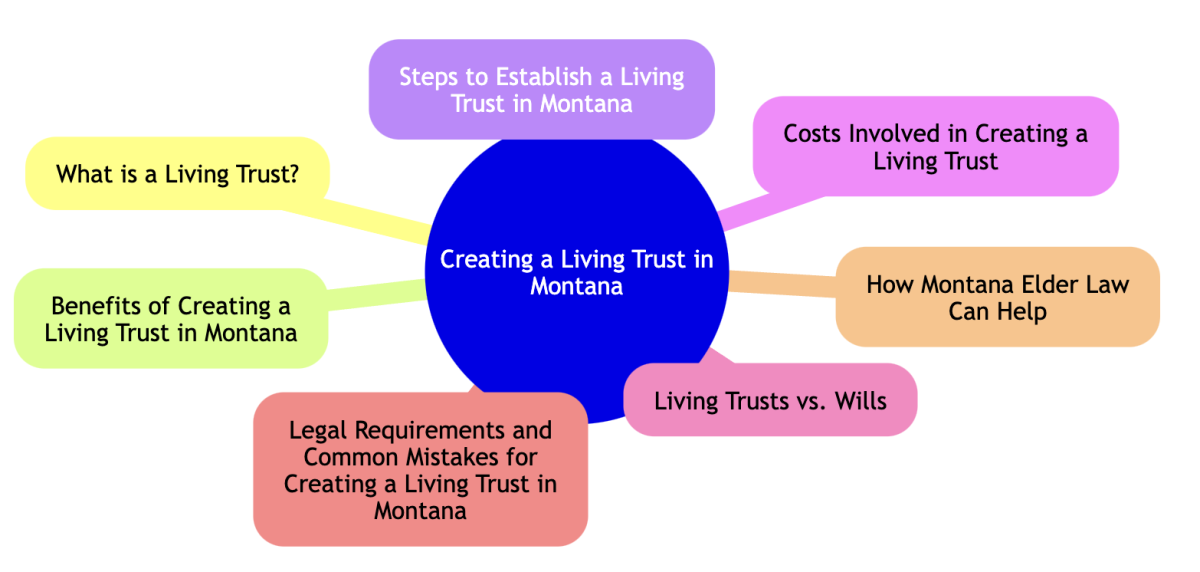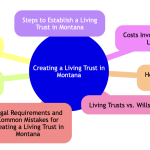Introduction to Living Trusts in Montana
Creating a living trust in Montana involves selecting the type of trust, drafting the trust document (with Montana specifics included), and transferring your assets into the trust.
A living trust is a key element in estate planning. It protects assets and guarantees their distribution according to your wishes.
A living trust can offer unique benefits for Montanans. For help following specific state guidelines, contact Montana Elder Law.
This article from Montana Elder Law will guide you through the process and advantages of establishing a living trust in Montana.
Key Takeaways
- A living trust allows you to manage and distribute your assets during your lifetime and after your death.
- To create a living trust in Montana, choose the type of trust, draft the document, and transfer assets into it.
- Costs can vary from a few hundred dollars for DIY options to over a thousand for professional legal help.
- Living trusts help avoid probate, maintain privacy, and provide flexibility in asset management.
- Montana's legal requirements include notarization of the trust document and compliance with state laws.

What is a Living Trust?
A living trust is a legal document that allows you to transfer your assets to beneficiaries while you are still alive.
It involves three main roles: the trustor (the person creating the trust), the trustee (the person managing the trust), and the beneficiaries (those who will receive the assets).
The trustor can also act as the trustee during their lifetime, with a successor trustee taking over upon their death.
There are two types of living trusts: revocable and irrevocable.
A revocable trust can be altered or revoked by the trustor at any time, providing flexibility and control.
On the other hand, an irrevocable trust cannot be changed once it is established, which can offer certain tax advantages and protection from creditors.
Benefits of Creating a Living Trust in Montana
Creating a living trust in Montana offers several key benefits.
First and foremost, it helps you avoid the lengthy and costly probate process. By keeping your estate matters private, a living trust means that your affairs are not subject to public scrutiny.
Additionally, a living trust can provide tax benefits, particularly if you opt for an irrevocable trust.
Here are the main benefits of creating a living trust in Montana:
- Avoiding probate
- Maintaining privacy of estate matters
- Potential tax benefits
- Flexibility in managing assets
- Control over asset distribution
Steps to Establish a Living Trust in Montana
Choosing the Type of Trust
Decide between an individual or joint trust.
Individual trusts are best for singles, while joint trusts work well for couples.
Couples can also opt for separate individual trusts.
Taking Inventory of Your Property
List all your assets, including real estate, bank accounts, investments, and personal items.
Evaluate their value and decide which ones to transfer to the trust.
Selecting a Trustee
Choose a reliable trustee.
You can be your own trustee while alive, but appoint a successor trustee for after your death.
Be sure they are trustworthy and capable.
Creating the Trust Document
Draft the trust document, outlining asset management and distribution. In Montana, consider state-specific requirements such as complying with the Uniform Probate Code.
Hiring a Montana-based lawyer can ensure precision and adherence to local laws. Alternatively, for a cost-effective approach, use an online program tailored for Montana.
Be clear and detailed in your document.
Signing and Notarizing the Document
Sign the trust document in front of a notary public to make it legally binding.
Notarization prevents fraud and confirms understanding by all parties.
Funding the Trust
Transfer assets into the trust by changing ownership from your name to the trust's name. Proper funding avoids probate and aligns with your asset management wishes.
Living Trusts vs. Wills
Living trusts and wills are both essential estate planning tools, but they serve different purposes and offer distinct advantages.
Living trusts take effect as soon as they are created, allowing you to manage and distribute your assets during your lifetime. They help avoid the probate process, maintaining privacy and potentially saving time and money. However, they require notarization and do not name guardians for children or executors for your estate.
Wills, on the other hand, only take effect after your death. They are crucial for naming guardians for minor children and designating an executor for your estate. While wills are simpler and do not require notarization, they must go through probate, which can be a lengthy and public process.
Comparison Table
|
Feature |
Living Trusts |
Wills |
|
Names a property beneficiary |
Yes |
Yes |
|
Allows revisions to be made |
Depends on type |
Yes |
|
Avoids probate court |
Yes |
No |
|
Requires a notary |
Yes |
No |
|
Names guardians for children |
No |
Yes |
|
Names an executor |
No |
Yes |
|
Requires witnesses |
No |
Yes |
Legal Requirements for Creating a Living Trust in Montana
Creating a living trust in Montana involves specific legal steps. Draft a trust document that complies with Montana state laws, clearly stating your intentions and naming the trustor, trustee, and beneficiaries. Outline asset management and distribution. It's wise to have a legal professional review your document to avoid errors.
Montana follows the Uniform Probate Code, simplifying the probate process but still requiring proper documentation. For estates under $50,000, a simplified probate process is available. Sign the trust document in front of a notary public and be aware of additional fees for transferring assets into the trust.
Specific Montana Rules for Creating a Living Trust
- Uniform Probate Code: Montana follows this code, which simplifies probate procedures but requires proper documentation.
- Simplified Probate Process: Available for estates valued under $50,000, making it easier for small estates to settle.
- Notarization: Trust documents must be signed in front of a notary public to be legally binding.
- State-Specific Language: The trust document must include language that complies with Montana state laws.
- Fees: Be aware of potential notary and asset transfer fees specific to Montana.
Common mistakes include not properly funding the trust, meaning assets are not transferred into the trust, leading to probate issues.
Another error is not updating the trust document after significant life events like marriage, divorce, or the birth of a child. Keep your trust current to reflect your latest wishes.
How Montana Elder Law Can Help
Montana Elder Law offers extensive expertise in creating and managing living trusts.
Our professional guidance can make the process smoother and more secure.
Services Provided:
- Consultation services: Personalized advice tailored to your specific needs.
- Document drafting: Professional preparation and review of trust documents.
- Asset transfer assistance: Help with transferring assets into the trust.
- Ongoing trust management support: Continuous support to manage and update your trust as needed.
Protecting Assets with Living Trusts in Montana
Now that you are familiar with the benefits of living trusts, including avoiding probate, maintaining privacy, and potentially saving on taxes, and the steps to make one, the ball is in your court.
Research is always the first step, well done!
Now is the time for action.
Montana Elder Law is a trusted resource for those looking to create or manage a living trust.
Our expert attorneys know elder law in Montana like no one else. We specialize in helping folks maximize their resources for retirement, writing wills, estate planning, and more.
Reach out to us today for expert assistance in estate planning.




